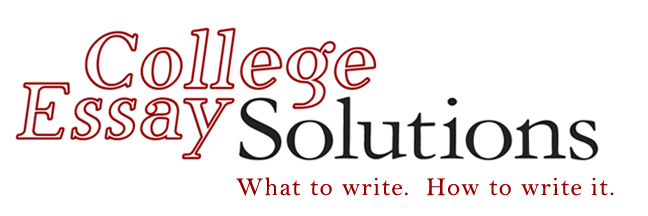Last year, I did a series of blogs called, “Twenty Five Ways to Make Your College Application Essay the Best Writing You’ve Ever Done.” The blogs included conceptual guidelines for writing an effective essay, as well as many technical writing tips. Longish title notwithstanding, response to the series was extremely positive.  For this year, and at this early stage of the college application “season,” I’m going to abbreviate those pieces and incorporate them into a series of blogs called, “Writing Your Best College Application Essay.” While they are sort of the appetizer portion size of the previous series, I believe you will still find them tasty.
For this year, and at this early stage of the college application “season,” I’m going to abbreviate those pieces and incorporate them into a series of blogs called, “Writing Your Best College Application Essay.” While they are sort of the appetizer portion size of the previous series, I believe you will still find them tasty.
-
Understand the Purpose of the Essay
When schools declare they want to know who an applicant is – beyond their GPA’s, standardized test scores, and three years of varsity tennis – they actually mean it. And, other than a face to face interview, an application essay is the best place to make that happen. That’s why, in writing their essays, students need to refrain from touting their accomplishments or trying to anticipate what Admission Directors want to hear. (https://www.dummies.com/education/college/understanding-your-audience-the-college-admissions-officers/) Instead, conceive and construct your essay to reveal as much of yourself as possible – your beliefs and dreams, your quirks, the pivotal moments in your life. Give the reader a clear idea of who you are and what kind of citizen you’ll be, once you arrive on campus. Not everyone wakes up in the morning wanting to tackle quantum physics. You are who you are. Own it.
-
Write Something Only You Can Write
With the number of college applications increasing each year, there is, unavoidably, a great deal of repetition in the subject matter of essays. That’s why students need to distinguish themselves with the topics they choose, and write something only they can write. This does not mean they can’t write about universal experiences like “making the team” or “not making the team.” It only means they have to make the experience highly personal.
Of course, getting completely away from these familiar themes can be even better, and to accomplish this, students need to go deep into their experiences and find something that is specific to them. This could be a family situation (standing up to an older brother who refused to accept dad’s new wife), an unexpected encounter (teaching a mentally challenged child to play Bingo, when everyone else had given up on her), or a special activity (early morning rock climbing with a close group of friends).
These singular experiences exist for everyone; the trick is first identifying them, then shaping them into a powerful essay.
-
Go Small
Students sometimes feel that by associating themselves with a major societal issue – climate change, poverty, the cure for a horrible disease – they will be demonstrating their seriousness as a human being. And to some extent, this is true. The danger, however, is that the essay then becomes more about the issue than the student. In most cases, therefore, I strongly suggest that the topic of your essay remains relatively small.
Of course, “small” does not mean trivial or frivolous; it means intimate, personal, and manageable. It means rather than writing about your burning desire to bring peace to the Middle East, you will be better served by exploring how you brokered peace between your parents and a noisy neighbor. It’s not that one subject is “better” than the other. It’s that the smaller topic will give a student more opportunities to reveal him or herself, which we all know is the primary purpose of the essay. (https://supercollege.com/guide/guide.cfm?t_id=1&g_id=18&step=1)
The abridged version…
Much of the work of writing an outstanding essay occurs before you put fingers to keyboard. Be sure you understand what schools are looking for, before you begin.
For more personal help with your college application essay or personal statement, contact Craig Heller directly at [email protected] or 818-445-4697.


